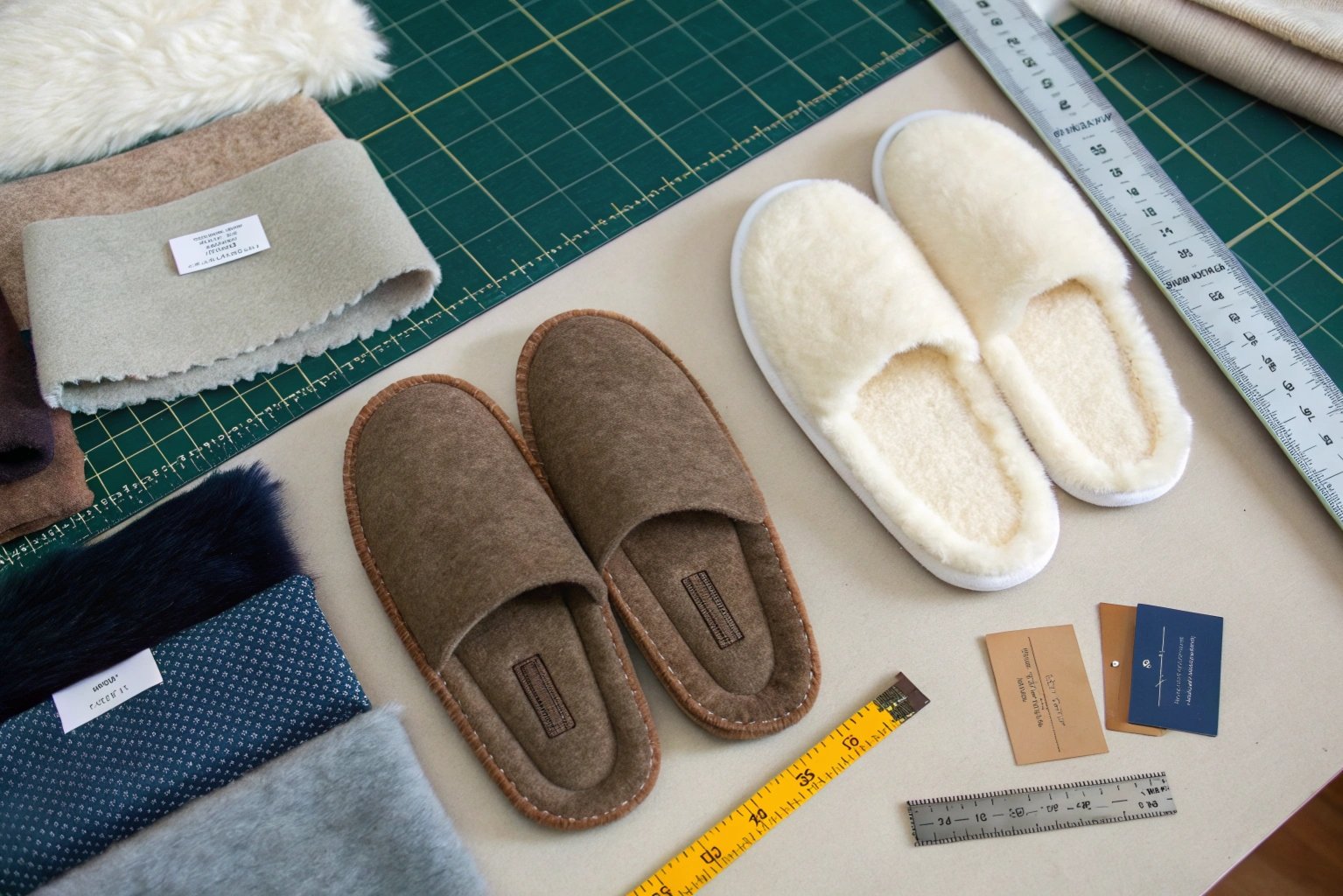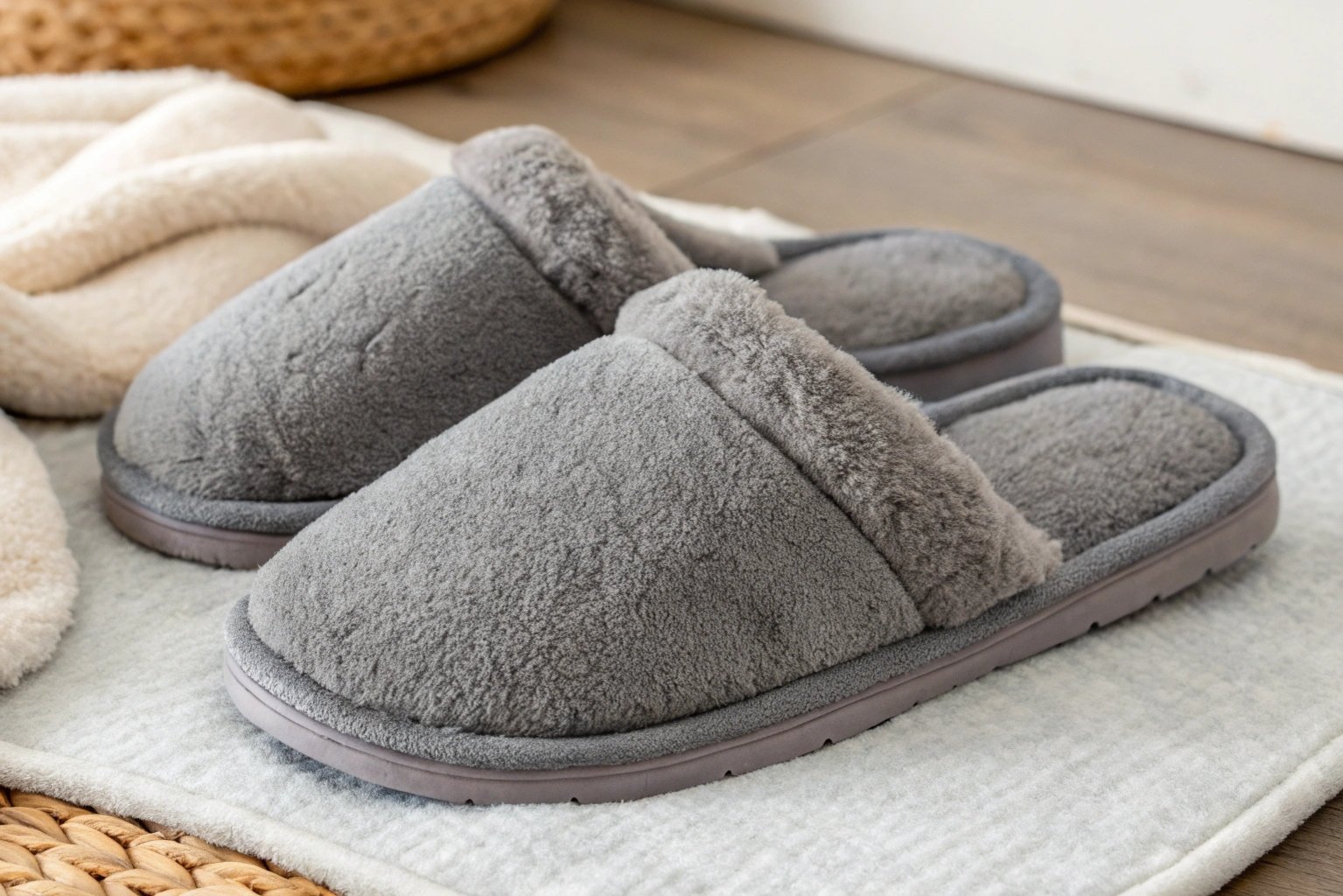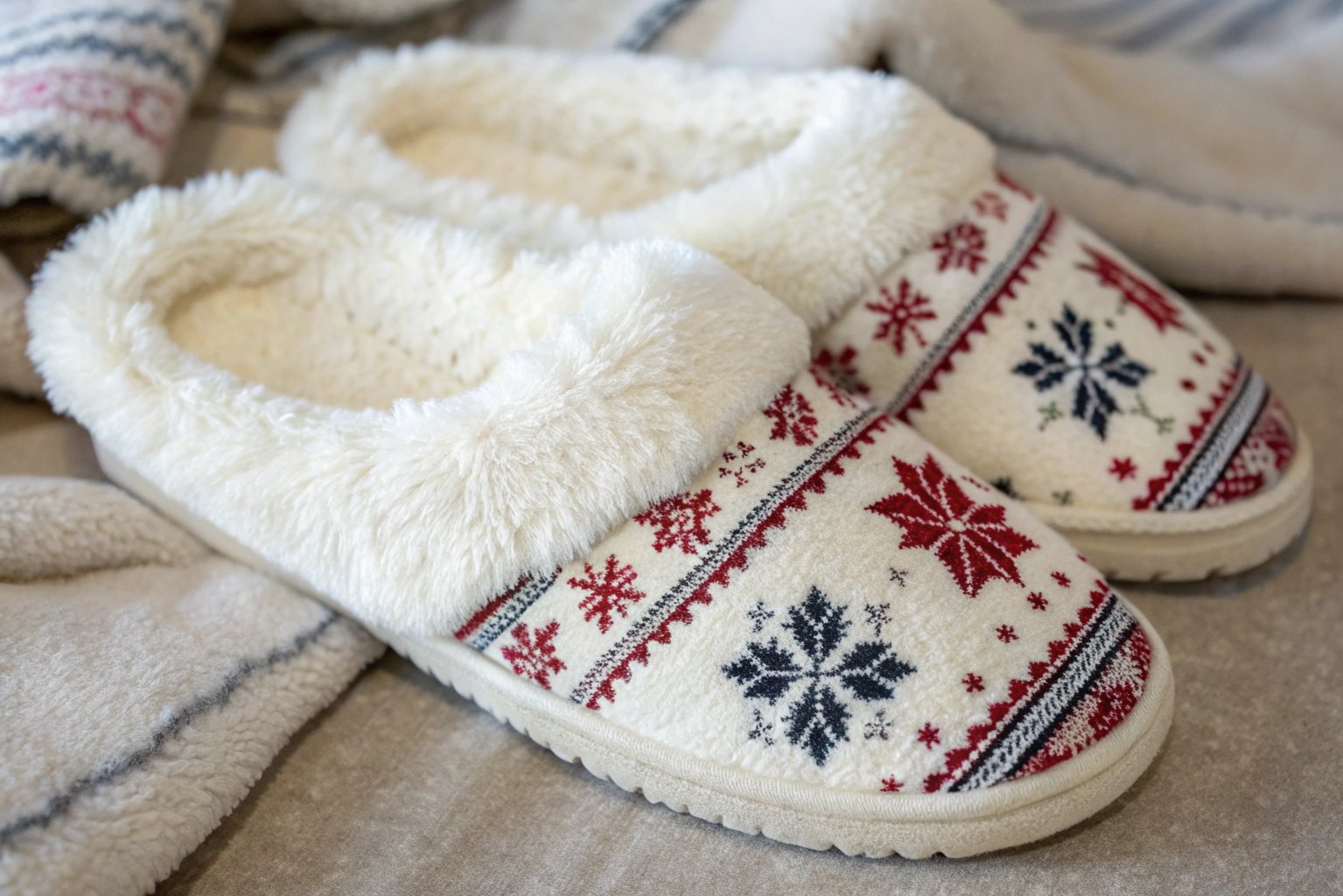Are your feet cold just thinking about winter? Imagine how your customers feel! Finding the right fabric can make or break a cozy slipper.
The mainstream choices for upper fabrics of winter slippers include fleece, cotton, wool, and faux fur. Each offers a unique blend of warmth, comfort, and cost-effectiveness to suit different consumer needs.

Picking the right fabric is important. So, let’s dive into the popular choices for winter slipper uppers.
Why Choose Fleece for Winter Slippers?
Is fleece a popular choice for a reason? Imagine the feeling of soft warmth on a chilly morning.
Fleece is a top choice for winter slipper uppers because it’s soft, warm, lightweight, and affordable. Its ability to trap heat makes it ideal for keeping feet cozy in cold weather.

Fleece slippers are a great option because they are easy to care for and come in many colors and patterns. We often recommend fleece to our clients looking for an affordable yet comfortable option. There are several types of fleece, each with its own benefits.
- Microfleece: Very soft and lightweight, good for sensitive skin.
- Polar Fleece: A bit thicker and warmer, ideal for colder climates.
- Sherpa Fleece: Resembles sheep’s wool, offering maximum warmth and a luxurious feel.
Here’s a simple table to break it down:
| Type of Fleece | Softness | Warmth | Weight | Cost | Best For |
|---|---|---|---|---|---|
| Microfleece | High | Medium | Very Light | Moderate | Sensitive skin, mild winter |
| Polar Fleece | Medium | High | Light | Moderate | Colder climates, general use |
| Sherpa Fleece | High | Very High | Medium | High | Maximum warmth, luxurious feel |
For ROCKDOVE FOOTWEAR, fleece could be a go-to for a balance of cost, comfort, and practicality. I often think about Robert Miller when discussing this, given his focus on cost-effectiveness.
Are Cotton Uppers Good for Winter Slippers?
Can cotton slippers be warm enough for winter? Think of your favorite cozy cotton pajamas.
Cotton can be a good choice for winter slipper uppers, especially for those who prefer natural fibers. While not as warm as fleece or wool, it’s breathable, soft, and absorbent, making it comfortable for indoor wear.

Cotton slippers are a solid choice, especially when combined with a warm lining like fleece or wool. I’ve seen many customers in South America prefer cotton due to its breathability. The key is to choose a thick, high-quality cotton to ensure durability and some level of warmth. There are different types of cotton to consider:
- Organic Cotton: Grown without pesticides or synthetic fertilizers, appealing to eco-conscious consumers.
- Flannel Cotton: Soft and napped, providing extra warmth and comfort.
- Terry Cotton: Highly absorbent, good for after-shower or spa slippers.
Here’s a comparison to help you choose:
| Type of Cotton | Breathability | Warmth | Absorbency | Cost | Best For |
|---|---|---|---|---|---|
| Organic Cotton | High | Low | Medium | High | Eco-conscious consumers |
| Flannel Cotton | Medium | Medium | Low | Moderate | Extra warmth and comfort |
| Terry Cotton | Medium | Low | High | Moderate | After-shower or spa slippers |
I always keep Robert Miller’s concerns in mind. Ethical sourcing is important, so organic cotton could be a plus, even if it costs a bit more.
How Warm Are Wool Slippers?
Want the ultimate in warmth? Picture sinking your feet into a pair of thick, wool socks.
Wool is known for its exceptional warmth and insulation properties, making it an excellent choice for winter slipper uppers. It naturally wicks away moisture, keeping feet dry and comfortable even when they sweat.

Wool slippers are a premium option, offering superior warmth and comfort. They are great for colder climates and for those who want extra insulation. There are different types of wool to consider:
- Merino Wool: Soft, fine fibers that are less itchy than traditional wool.
- Sheep’s Wool: A more traditional option, offering excellent warmth and durability.
- Wool Blend: A mix of wool and synthetic fibers, offering a balance of warmth and cost-effectiveness.
Here’s a quick comparison:
| Type of Wool | Warmth | Softness | Durability | Cost | Best For |
|---|---|---|---|---|---|
| Merino Wool | High | Very High | Medium | High | Premium comfort, less itchy |
| Sheep’s Wool | Very High | Medium | High | Moderate | Traditional warmth and durability |
| Wool Blend | Medium | Medium | High | Low | Cost-effective warmth |
Wool’s natural moisture-wicking properties are a big advantage. I always think about quality and brand reputation, something Robert Miller takes very seriously.
Why Consider Faux Fur for Slipper Uppers?
Looking for a touch of luxury? Think of the softest, most glamorous fur coat.
Faux fur is a popular choice for winter slipper uppers because it provides a luxurious look and feel at an affordable price. It’s also a cruelty-free alternative to real fur, appealing to ethically conscious consumers.
Faux fur slippers add a touch of glamor. We often see demand for faux fur in promotional slippers and among retailers targeting a younger demographic. The quality of faux fur can vary, so it’s important to choose a high-quality material that looks and feels good. Types include:
- Acrylic Faux Fur: Soft, plush, and easy to care for.
- Modacrylic Faux Fur: More durable and resistant to wear and tear.
- Polyester Faux Fur: Affordable and versatile, available in many colors and textures.
Here’s a breakdown:
| Type of Faux Fur | Softness | Durability | Cost | Best For |
|---|---|---|---|---|
| Acrylic | High | Medium | Moderate | Soft, plush look and feel |
| Modacrylic | Medium | High | Moderate | Durable, long-lasting slippers |
| Polyester | Medium | Medium | Low | Affordable, versatile designs |
Remember Robert Miller’s concerns about ethical sourcing? Faux fur avoids any ethical issues related to animal products. This option could align with ROCKDOVE FOOTWEAR’s brand values.
Conclusion
Choosing the right upper fabric is essential for winter slippers. Consider fleece, cotton, wool, and faux fur based on warmth, comfort, and ethical considerations.

